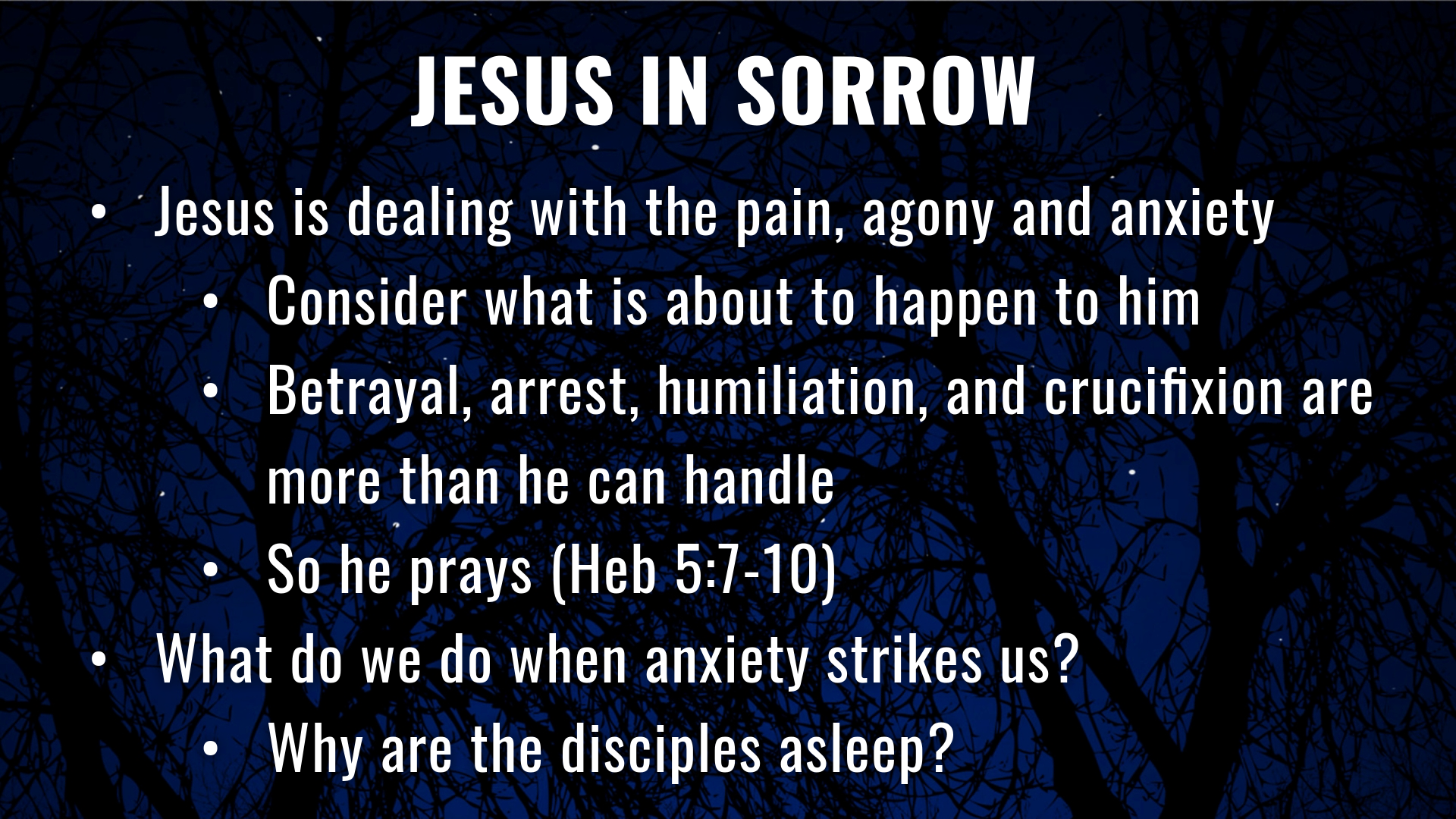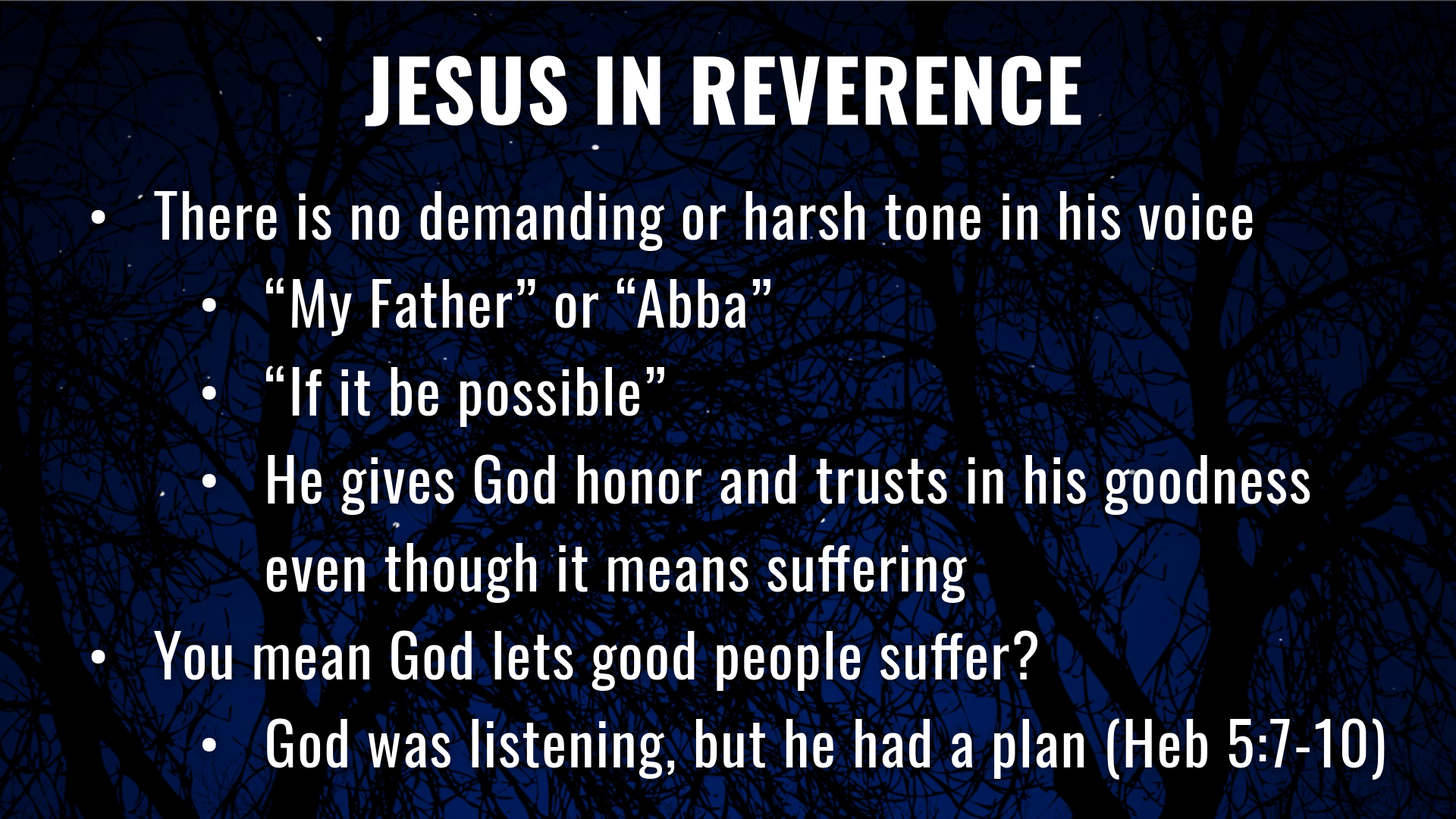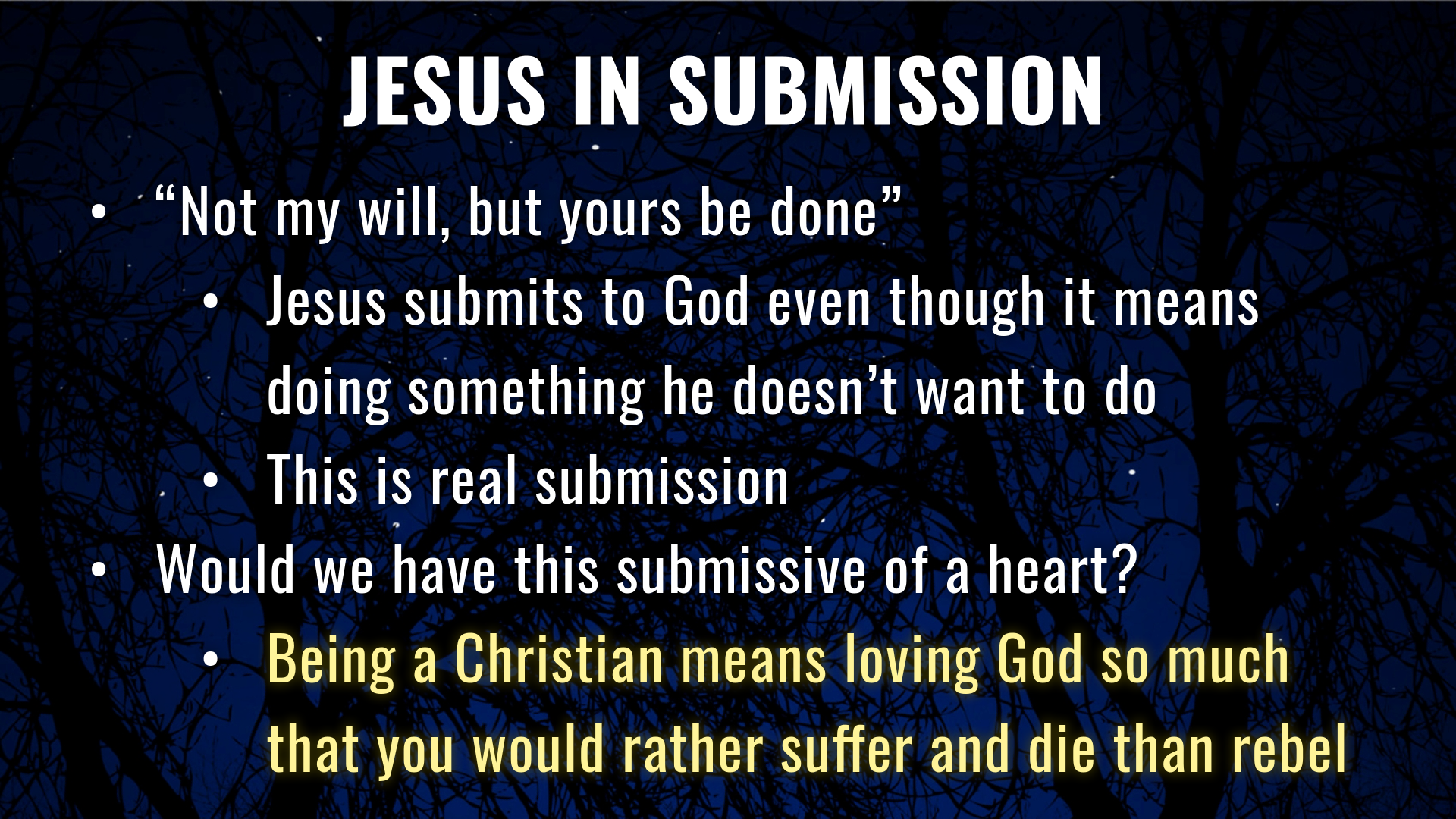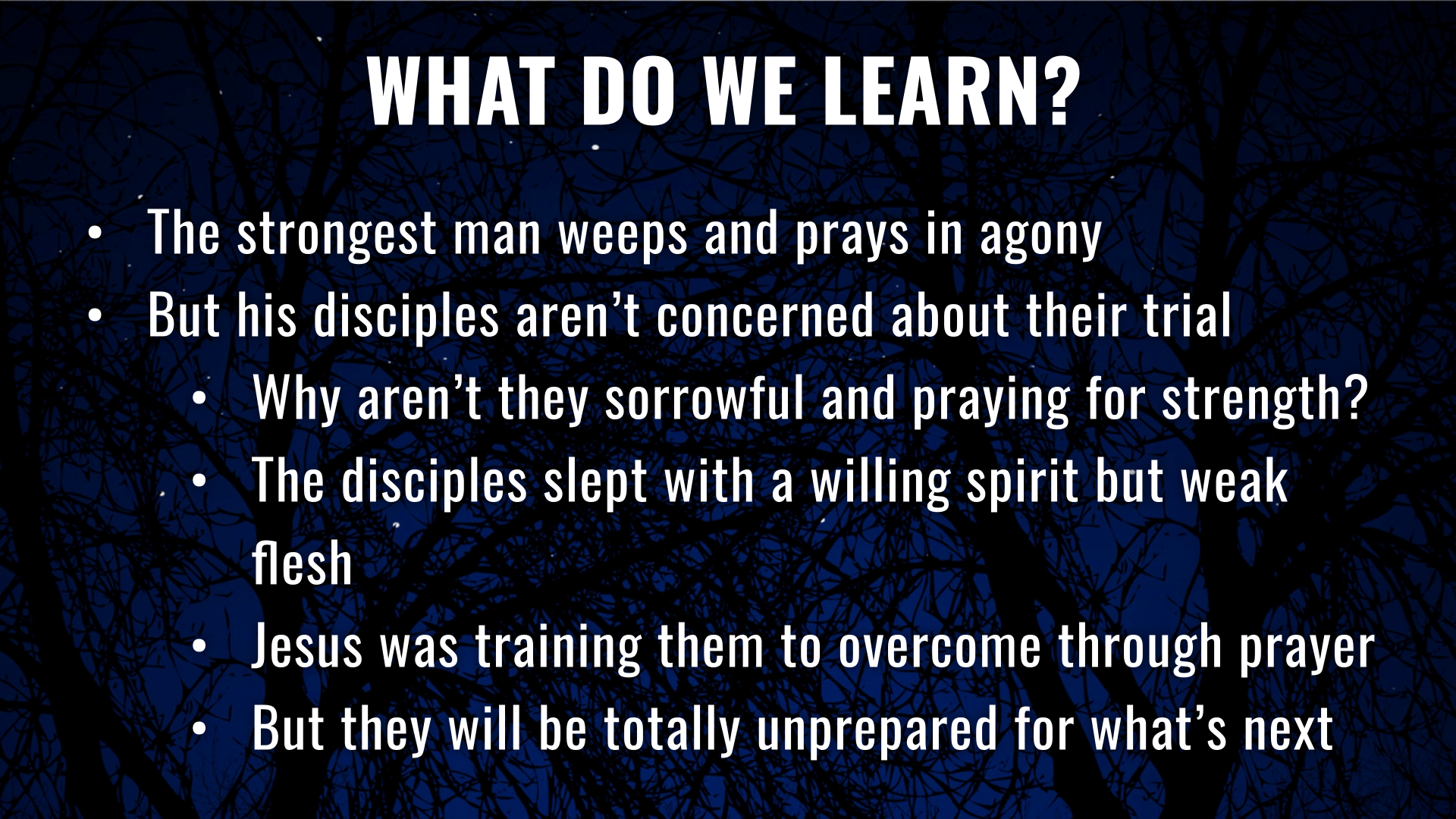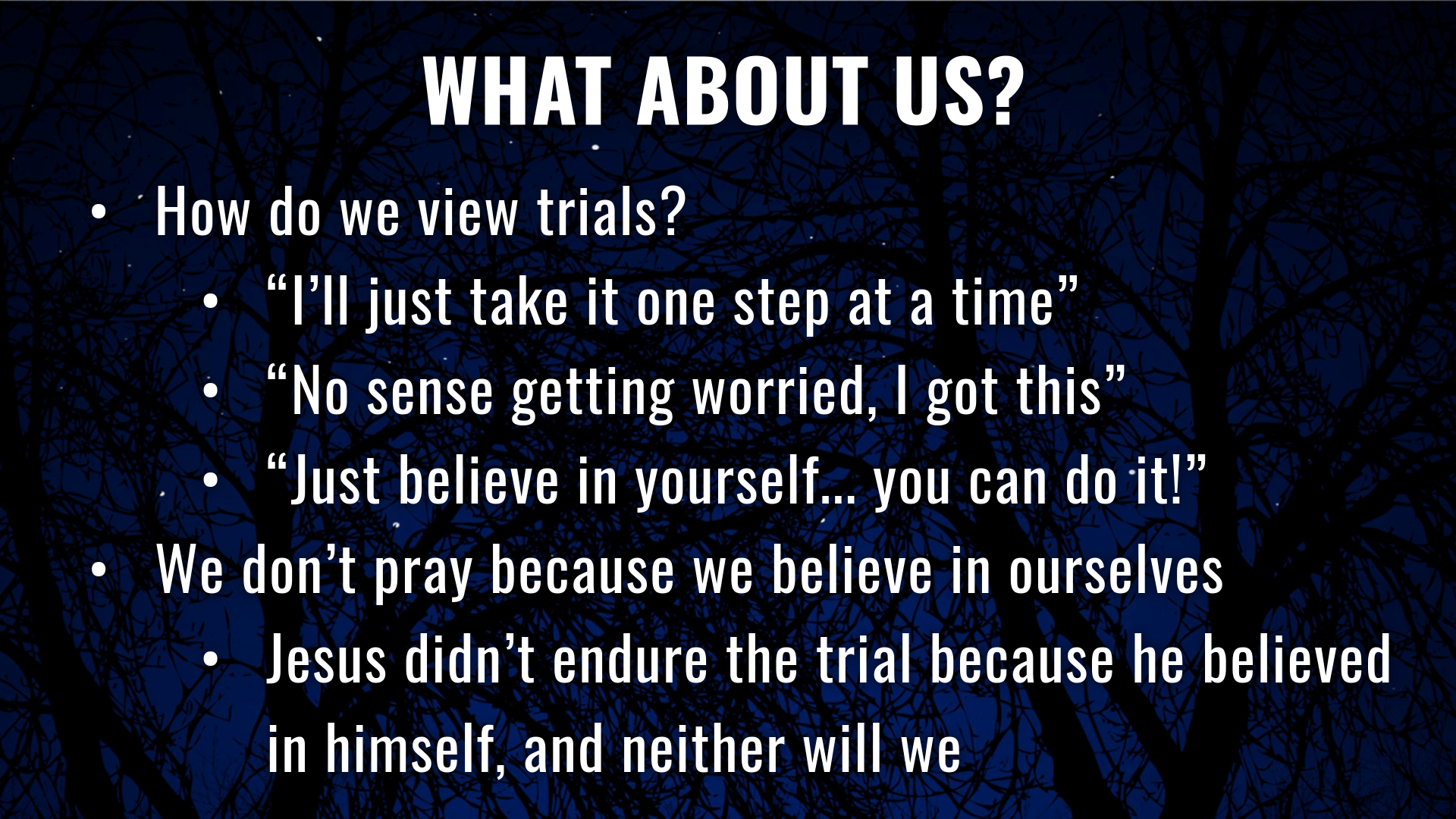The Flesh Is Weak (Matthew 26:36-46)
Everything has been done to prepare for Jesus’ betrayal except one thing. Before Jesus is betrayed, he wants to go to God in prayer. This will be the last time Jesus would withdraw to pray before being arrested. In this text, we see a different side of Jesus than we have ever seen before.
Matthew 26:36--46 (ESV) --- 36 Then Jesus went with them to a place called Gethsemane, and he said to his disciples, “Sit here, while I go over there and pray.” 37 And taking with him Peter and the two sons of Zebedee, he began to be sorrowful and troubled. 38 Then he said to them, “My soul is very sorrowful, even to death; remain here, and watch with me.” 39 And going a little farther he fell on his face and prayed, saying, “My Father, if it be possible, let this cup pass from me; nevertheless, not as I will, but as you will.” 40 And he came to the disciples and found them sleeping. And he said to Peter, “So, could you not watch with me one hour? 41 Watch and pray that you may not enter into temptation. The spirit indeed is willing, but the flesh is weak.” 42 Again, for the second time, he went away and prayed, “My Father, if this cannot pass unless I drink it, your will be done.” 43 And again he came and found them sleeping, for their eyes were heavy. 44 So, leaving them again, he went away and prayed for the third time, saying the same words again. 45 Then he came to the disciples and said to them, “Sleep and take your rest later on. See, the hour is at hand, and the Son of Man is betrayed into the hands of sinners. 46 Rise, let us be going; see, my betrayer is at hand.”
Jesus In Sorrow
In this text, we read about our Lord facing sorrow. He struggled with the pain and agony of betrayal, arrest, humiliation, and suffering on a cross. How did he choose to fight against his sorrow? He had time to escape. He could have prepared to fight. But he chose instead to pray.
Once Jesus and all of the disciples made it to Gethsemane, he told his disciples to stay in one location while he, Peter, James, and John went a bit farther. Then, Jesus showed his three closest disciples what was on his heart. In this text, it appears that Jesus lets go of the restraints on his sorrow. He was distressed, anxious, and in agony over what would happen to him and his disciples.
I’m tempted to think that the author got it wrong when I read this. Jesus wasn’t the upset type. He knew everything that would happen before it happened, and he was always ready for anything. But knowing what was about to happen was the worst part in this case. Knowing that he would be mocked and humiliated, knowing that those he loves will fall away “because of him,” and knowing that it would all end with torture on a cross is having its effect on Jesus’ body and soul. Some things are outside of the control of a human being. Sometimes the body has a mind of its own, and it is debilitating. Jesus shows all of this to his disciples to know that he is human and he has struggles that are beyond him.
Hebrews 5:7--10 (ESV) --- 7 In the days of his flesh, Jesus offered up prayers and supplications, with loud cries and tears, to him who was able to save him from death, and he was heard because of his reverence. 8 Although he was a son, he learned obedience through what he suffered. 9 And being made perfect, he became the source of eternal salvation to all who obey him, 10 being designated by God a high priest after the order of Melchizedek.
This text displays what Jesus was doing. He offered prayers and supplications with loud cries and tears to God. Jesus, who healed thousands and won every argument against religious leaders, cried loudly over what he was about to go through.
What a tremendous example this is for us. How often do we face a trial that debilitates us? So often, we are sorrowful and troubled about things that might never happen, but Jesus knows what is about to happen to him. Can you imagine? If we knew what would happen, we might put on a show in front of our friends and family to keep them from getting worried, but Jesus shows us that we don’t have to put on a show in front of God. We can let God see our deepest concerns and struggles. Jesus exemplifies that for us. He wanted his disciples to know that he understood what that was like.
When we compare this to the disciples, we see that they aren’t sorrowful. They are asleep. They aren’t concerned about the huge trial and test they will face. Can we relate to that? Did you ever stop to think about why they aren’t concerned? They don’t believe in the spiritual warfare that is taking place. Jesus told them it’s about to happen, but they can’t see it, so they don’t believe it. Often, I think Satan wants us to be like these disciples. He wants us to live carefree because that makes us easy targets. Jesus shows us that we need a deep concern over the spiritual trials and tests that we are about to face. Then, he takes those concerns to God and asks for strength.
Jesus In Reverent Prayer
There is another attribute of Jesus I want us to notice. Think about his reverence.
Matthew 26:38--39 (ESV) --- 38 Then he said to them, “My soul is very sorrowful, even to death; remain here, and watch with me.” 39 And going a little farther he fell on his face and prayed, saying, “My Father, if it be possible, let this cup pass from me; nevertheless, not as I will, but as you will.”
First, Jesus tells his disciples that his soul is sorrowful, even to death. But, as he prays to God, he remains reverent. He does not become demanding or harsh toward God. He is not losing his grip on the faithfulness demonstrated through his ministry.
He says, “If it be possible.” In Mark’s account, he says, “Abba, Father, all things are possible for you. Remove this cup from me.” We see in Jesus the glory he gives to God. He calls him “My Father” in Matthew’s account and “Abba” in Mark’s account, the word meaning daddy. The first part of what Jesus says is so respectful and full of praise. God is given the honor by Jesus, saying that he is a good Father who knows what is best and can do anything. He speaks this way toward God, who will allow him and his friends to suffer.
So often, the world around us uses their suffering as justification for blaspheming God’s name or talking about him like he is evil. They claim that God doesn’t care about them because they suffer. Notice that Jesus shows us how wrong that is. God is not letting Jesus suffer because he doesn’t care. He is letting him suffer because he cares so much. How do you think a father would feel when his child suffers? It’s not something that the Father wants to witness. In some ways, it hurts the father more than the child. But a good Father lets the child suffer when it is for their good. In this case, Jesus is going to learn obedience and be made perfect or complete. Through this suffering, Jesus shows his belief that God is still good all the time.
People who stop revering God don’t believe God is good. They think that God wants to hurt them instead of serving them. We do the same thing. We don’t believe that suffering leads us to glory, so we don’t revere God. We should also have this attitude of reverence toward God. We should hope in his goodness. We should hope in his power and strength. We should believe that he is our loving heavenly Father no matter what we face.
Hebrews 5:7--10 (ESV) --- 7 In the days of his flesh, Jesus offered up prayers and supplications, with loud cries and tears, to him who was able to save him from death, and he was heard because of his reverence. 8 Although he was a son, he learned obedience through what he suffered. 9 And being made perfect, he became the source of eternal salvation to all who obey him, 10 being designated by God a high priest after the order of Melchizedek.
Notice that God heard Jesus because of his reverence. Also, notice that God plans to make Jesus perfect and the source of salvation for all of us. Aren’t you glad God wanted Jesus to suffer? It resulted in our benefit!
Jesus In Submission
In thinking about Jesus’ prayer to God, it’s hard not to notice his submission. Jesus knew that his suffering had a purpose. He wanted God’s will to be accomplished, but he asked God to find another way. He recognizes that God is over him, and he tells God not to do what he wants but whatever God wants. These words are at the heart of what it means to be a follower of Christ. Being a Christian means that you love God so much that you would rather him let you die than compromise his plans to glorify himself through you.
Wow! This is such an excellent example for us. Jesus doesn’t want to die, but he is willing to die for God’s glory.
What About Us?
How does this affect our prayer lives and our view of suffering? When we see Jesus being so submissive, we need to ask ourselves, “Why don’t we have a submissive heart like Jesus?” First, notice that the disciples didn’t want to believe in God’s will. They wanted to believe that God wouldn’t let Jesus die because that’s what they had imagined in their head. They worship a God who follows their rules and doesn’t let anyone suffer. That’s not the God of the Bible.
Have you ever imagined a perfect picture in your head of the way things should go? What if God’s word contradicts that ideal? It’s easy for us to dismiss God’s word and hold on to our ideal. That’s what the disciples did. But that’s not what Jesus did. He changed his ideal to include what he knew God wanted. Jesus doesn’t assume that God’s will is different, nor does he demand God change his will to match his ideal (What many people do today). Jesus asks God to make his will happen differently, but he ultimately submits to whatever God wants.
Summary
Jesus shows us how to pray in trials. We need to believe trials and tests will come. We need to believe God still cares for us and works for our good when we suffer. We need to submit to whatever God’s will is for our lives. Jesus recognizes this, he asks God to take away the suffering, recognizing that nothing is impossible for God, but he knows that God knows best. Sometimes we need God to say “No” to our prayers. God doesn’t want to say no. He wants to give us what we want as a loving Father would.
Matthew 7:7--11 (ESV) --- 7 “Ask, and it will be given to you; seek, and you will find; knock, and it will be opened to you. 8 For everyone who asks receives, and the one who seeks finds, and to the one who knocks it will be opened. 9 Or which one of you, if his son asks him for bread, will give him a stone? 10 Or if he asks for a fish, will give him a serpent? 11 If you then, who are evil, know how to give good gifts to your children, how much more will your Father who is in heaven give good things to those who ask him!
God wants to say “Yes” to our prayers, and we should expect him to if we ask for things that we think are good. God wants us to use our imaginations and believe that God can do exceedingly, abundantly, above all we ask or think. But we also need to understand that he knows more than we do about it. He knows how to work things out in a better way than anything we could even imagine.
So being okay with God saying, “No,” does not mean that we shouldn’t pray. It means we should pray more often. There is a spiritual battle that we are too weak to fight independently. We should pray all the time with our best understanding of what is good. However, we should have a reverence and respect for our Father’s wisdom like Jesus, and we should determine in ourselves to be obedient no matter what the answer is.
In the second prayer, Jesus no longer says, “If it’s possible.” He says, “If this cannot pass unless I drink it, your will be done.” We get the sense that he has accepted it. He is growing stronger in his prayer and more resolute to follow through with God’s mission for him.
Conclusion
In this event, the disciples are spiritually asleep and unprepared for what will happen to them. When the trial comes upon them, they haven’t prayed as they should. They lack the strength to stand for what’s right and glorify God because they haven’t understood how difficult this trial will be. That’s the disciples’ problem, and that is our problem.
But this is not the end of their story, nor is it the end of ours. There is spiritual growth in their lives, and there can be spiritual growth for us. Incredibly, we will read about these same men being beaten and rejoicing over it. How were they able to do that? Acts tells us that they were devoting themselves to fasting, prayer, and the study of the word. We need to go to God in prayer for strength with reverence and submission. We would rejoice over the opportunity to serve Christ in that way. We need the spiritual awareness to know when our trials are coming and to pray before they get here so that we can stand firm for Christ.
Jesus endured tremendous suffering for us. What will we give to him? Do we see our weakness, and are we praying for strength to be faithful to God’s will in the trials?


